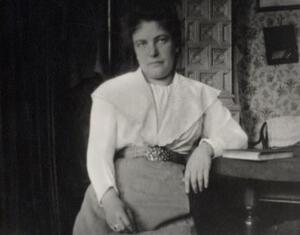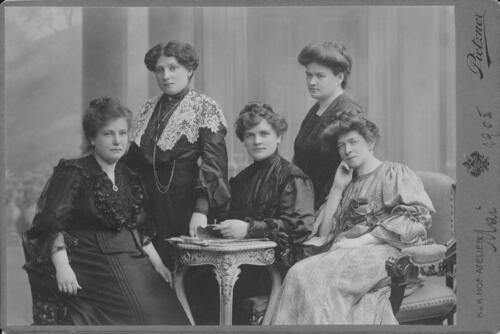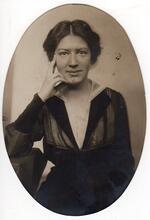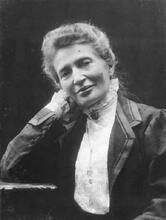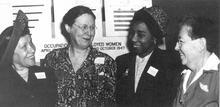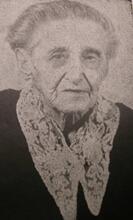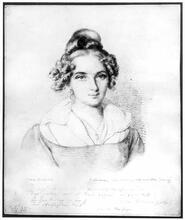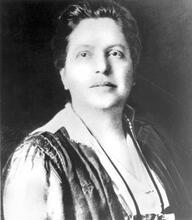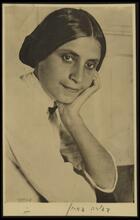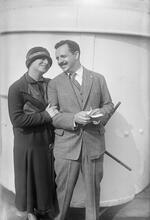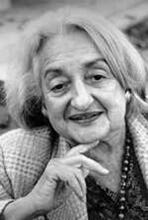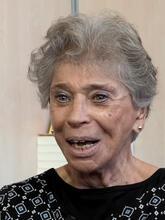Therese Schlesinger-Eckstein
Therese Schlesinger, a widowed mother of a daughter, devoted herself ardently to the socialist cause despite her physical ailments. In March 1919, she was among the first female politicians elected to the Austrian parliament and had a lasting impact on a new generation of Austrian female socialists, such as Käthe Leichter (1895–1942) and Stella Klein-Löw (1904–1986). In her autobiographical writings, Schlesinger hardly ever referred to her Jewish background. Given the context of an increasingly secular Jewish population in turn-of-the-century Vienna, this was not uncommon. However, the ambivalence within the Social Democratic Party towards its many Jewish members and the fact that it was not immune to anti-Semitic tendencies contributed to her position within the party being disputed.
Therese Schlesinger’s life was characterized by her lifelong passion for learning and her endeavor to improve the plight of working-class women. She was a dedicated feminist who was inspired by the ideals of socialism, struggling to combine both of these political passions within the Austrian Social Democratic Party.
Family Background and Liberal Jewish Upbringing
Therese Eckstein was born in Vienna, Austria, on June 6, 1863, the third of ten children in a liberal Jewish family. Her father, Albert Eckstein (1825–1881), a graduate of the Prague Technical University, was a pioneer in the development of parchment paper. He was an acquaintance of the philosophers Ernst Mach (1838–1916) and Joseph Popper-Lynkeus (1838–1921). Her mother, Amalie Wehle (1836–1921), was born in Prague and was unusually well educated for a woman of her time. Together with her husband, she regularly attended seminars at Vienna University.
Given the progressive atmosphere at home, four out of the eight surviving Eckstein siblings (two brothers died during infancy) became influential figures in turn-of-the-century Vienna. Schlesinger’s older brother Friedrich Eckstein (1861–1939), the legendary Mac Eck, was a dazzling character within the Viennese intellectual scene. An expert in various academic fields, ranging from the natural sciences, astronomy, linguistics, and theology to mathematics and musicology, he was closely acquainted with other famous Viennese intellectuals such as Sigmund Freud (1856-–1939), Arthur Schnitzler (1862–1931), Karl Kraus (1874–1936), and Victor Adler (1852–1918). Therese Eckstein’s younger sister, Emma Eckstein (1865–1924), who also became active in the emergent women’s movement, was one of the first patients of Sigmund Freud and subsequently became one of his students. The youngest of the siblings, Gustav Eckstein (1875–1916), was a renowned Social Democrat and close friend of Karl Kautsky (1854–1938).
Feminism: Overcoming Personal Misfortunes and Limited Formal Education
Unlike her brothers, Therese Eckstein was denied a higher education. In Habsburg Austria, schools preparing girls for university were only established in the last decade of the nineteenth century. Throughout her life, Eckstein constantly strove to overcome the limitations of her formal education. In the summer of 1888, she married Victor Schlesinger, a bank clerk fifteen years her senior. In the following year, she gave birth to her daughter Anna. The delivery turned into a traumatic experience: The midwife who assisted her during labor infected Schlesinger with a measles infection, which resulted in impaired mobility for life. Shortly thereafter, her husband died of tuberculosis. During this difficult time, her friend Marie Lang (1858–1934) introduced her to the newly founded radical feminist organization Allgemeiner Österreichischer Frauenverein (AÖFV) and in 1894 Schlesinger became a member. She soon belonged to the close circle of activists around the pioneering Austrian feminist Auguste Fickert (1855–1910), who became her mentor and encouraged her to publish her first articles.
Awakening Interest in Socialism
In 1896, Schlesinger participated in a conference on the conditions of Viennese female workers, which introduced her to the plight of the female proletariat and awakened her interest in socialism. During the first international women’s congress in Berlin, participating as a delegate of the AÖFV, she referred to the Social Democratic Party as the only organization that realized equality, which caused a rift with the feminist movement and led to tensions in the relationship with her mentor Auguste Fickert. Subsequently, Therese Schlesinger was caught in an internal struggle between her feminist and socialist loyalties. During this time, she started to attend the lectures of Emil Reich (1864–1940) on social ethics at Vienna University. In the fall of 1897, Therese Schlesinger officially joined the Social Democratic Party, but this step could not ultimately solve the conflict between her diverging political interests. Within the party, she was now confronted with ambiguous policies regarding the feminist cause.
Between Feminism and Socialism
This ambivalence made itself felt as early as spring 1898 in the run-up to the first Social Democratic Women’s Conference, when party officials feared a weakening of the party’s power by female separatism. The conference eventually took place with the party’s blessings. At about the same time, Therese Schlesinger started her eclectic publishing activities for various socialist papers. Her first publication, in 1897, was an article in the German newspaper Neue Zeit, edited by the socialist Karl Kautsky, who became her lifelong mentor and friend. Her correspondence with Kautsky and Auguste Fickert in the following years indicates that her position within the party was not undisputed. Besides encountering accusations of female separatism, she was also met with reservations because of her Jewish origins and her bourgeois background, which was augmented by her political history in the feminist movement. Nevertheless, she dedicated herself fervently to the social democratic cause and worked ceaselessly for the party despite her physical ailments. One of her main agendas was the implementation of women’s suffrage. At the Party Congress in Graz in 1900, she criticized the party’s attitude towards this issue, stating that most officials perceived the question of voting rights as an issue related solely to the male proletariat. Her pamphlet, “What Women Want in Politics” (Vienna 1909), emphasized this subject and stressed the importance of educating women toward political maturity. At the same time, she fought for the protection of working mothers and suggested the adoption of a national maternity insurance. Her publications in social democratic newspapers include several articles on this topic.
Internationalism and Election to Parliament
During World War I, Therese Schlesinger was among the members of the leftist opposition under the leadership of Friedrich Adler (1879–1960) who fought for the ideals of internationalism and peace in a time dominated by belligerent patriotism. In 1919, she was elected as one of the first female members of parliament in the newly founded Austrian Republic, representing the Social Democratic Party. In the following years, she attracted the attention of a circle of young female socialists, including Käthe Leichter and Stella Klein-Löw, to whom she became an adored mentor and role model.
End of her Life as a Refugee in France
Therese Schlesinger remained politically active until 1933, when she retired from the party leadership. In 1934, the Austrian Social Democratic Party was forced into illegality by the Austro-fascist government. After the Nazi takeover in Austria in 1938, the frail 75-year-old activist managed to escape to France, where some of her female political companions had found refuge. She died in a sanatorium in Blois on June 5, 1940, on the eve of her birthday and shortly before the onset of the German occupation.
Selected Works
“Das Doppeljoch der Mütter. Mutterschaftsversicherung - Ein Vorschlag für das künftige Parteiprogramm,” Arbeiter-Zeitung, Vienna, March 7, 1926.
“Das Wahlrecht der Frauen, ” in Österreichischer Arbeiter-Kalender für das Jahr 1907. Vienna: 1907.
“Die Ehre des Kindes.” Arbeiter-Zeitung, Vienna, January 1, 1905.
Die Frau im sozialdemokratischen Parteiprogramm. Vienna: Verlag der Wiener Volksbuchhandlung, 1928.
Die geistige Arbeiterin und der Sozialismus. Vienna: Heller, 1919.
Translation of William Godwin, Erinnerungen an Mary Wollstonecraft. Halle: Thamm, 1912).
“Frauenarbeit und proletarische Lebenshaltung.” Arbeiter-Zeitung, Vienna, February 3, 1925.
“Geburtenbeschränkung und Justiz.” Der Kampf 6 (1926): 253–256.
“Mein Weg zur Sozialdemokratie.” In Gedenkbuch. 20 Jahre österreichische Arbeiterinnenbewegung, ed. Adelheid Popp. Vienna: Verlag der Wiener Volksbuchhandlung, 1912.
Was wollen die Frauen in der Politik? Vienna: Wiener Volksbuchhandlung, 1909.
Wie will und soll das Proletariat seine Kinder erziehen? Vienna: Verlag des Frauenreichskomitees, 1921.
“Wöchnerinnenschutz.” Dokumente der Frauen, Vienna, April 1, 1901.
“Zum Problem der Mutterschaft.” Der Kampf 10 (1927): 475–479.
“Zur Psychologie der Geschlechter.” Der Kampf 6 (1925), 225-229.
Bock, Eva. “Therese Schlesinger (1863–1940): Eine Untersuchung über ihr politisches und publizistisches Wirken in der sozialdemokratischen Frauenbewegung.” Ph.D. diss., University of Vienna, 1987.
Embacher, Helga. “Außenseiterinnen: bürgerlich, jüdisch, intellektuell, links.” L’Homme. Zeitschrift für Feministische Geschichtswissenschaft 2, no. 2 (Spring 1991), 57–76.
Hauch, Gabriella. “Therese Schlesinger.” In Wissenschafterinnen in und aus Österreich. Leben, Werk, Wirkung, ed. Brigitta Keintzel and Ilse Korotin, 650–655. Vienna and Cologne: Böhlau, 2002.
Hauch, Gabriella “‘Against the Mock Battle of Words’—Therese Schlesinger, neé Eckstein (1863–1940), a Radical Seeker.” In Austrian Lives, ed. Günter Bischof, Fritz Plasser, and Eva Maltschnig, 71-91. New Orleans: University of New Orleans Press, 2012.
Hauch, Gabriella. “Schreiben über eine Fremde. Therese Schlesinger (1863 Wien – 1940 Blois bei Paris).” ÖZG 19, no. 2 (Spring 2008): 98–117.
Jaindl, Birgit. “Therese Schlesinger (1863–1940): Ihr publizistischer Beitrag zur Gleichberechtigung der Frau insbesondere zur Förderung der Frauenbildung in der Ersten Republik.” MA thesis, University of Vienna, 1994.
Klein-Löw, Stella. “Therese Schlesinger.” In Werk und Widerhall. Große Gestalten des österreichischen Sozialismus, ed. Norbert Leser, 353-362. Vienna: Verlag der Wiener Volksbuchhandlung, 1964.
Lafleur, Ingrun. “Five socialist women: Traditionalist conflicts and socialist visions in Austria 1893–1934.” In Socialist Women: European Socialist Feminism in the Nineteenth and Early Twentieth Centuries, ed. Marilyn J. Boxer and Jean H. Quataert, 148-215. New York: Elsevier, 1978.
Raggam-Blesch, Michaela. Zwischen Ost und West. Identitätskonstruktionen jüdischer Frauen in Wien. Innsbruck and Vienna: Studienverlag 2008.
Rose, Alison. Jewish Women in Fin-de-Siècle Vienna. Austin, TX: University of Texas Press, 2010.
Tichy, Marina. “Therese Schlesinger: Bürgerin und Sozialistin.” In “Die Partei hat mich nie enttäuscht…” Österreichische Sozialdemokratinnen, ed. Edith Prost, 135-184. Vienna: Verlag für Gesellschaftskritik 1989.
Tichy, Marina. “Feminismus und Sozialismus um 1900: Ein empfindliches Gleichgewicht. Zur Biographie von Therese Schlesinger.” In Die Frauen der Wiener Moderne, ed. Lisa Fischer and Emil Brix, 83-100. Vienna: Verlag für Geschichte und Politik, 1997.

